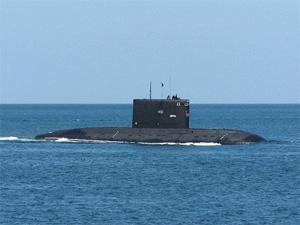| Tell a friend | Print version |
|---|
Russia, Ukraine still arguing over Black Sea Fleet
Source: , author: RIA Novosti military commentator Ilya Kramnik
The Alrosa, Black Sea Fleet's sub (rosbalt.ru)
Russia and Ukraine have been arguing over the Sevastopol-based Black Sea Fleet for a long time.
In the first years following the break-up of the Soviet Union, the two countries, both legal successors to the U.S.S.R., wrangled over the distribution of warships, bases and other naval property.
Although the Black Sea Fleet was divided in 1997, Moscow and Kiev did not ratify the relevant bilateral agreements until March 24, 1999. Moreover, both sides continue their heated arguments over the fleet's future.
The struggle for the Black Sea Fleet's future began on April 5, 1992 when the then Ukrainian President Leonid Kravchuk signed a decree On Urgent Measures to Develop the Ukrainian Armed Forces.
The document placed the former Soviet Black Sea Fleet under Kiev's jurisdiction. There were also plans to establish the Ukrainian navy on the basis of the fleet's elements deployed in Ukraine. In effect, this implied that Kiev would be able to control the entire Black Sea Fleet. However, the Ukrainian government had no right to make this decision.
At that time, the Black Sea Fleet was part of the Joint CIS Armed Forces and the CIS Navy, commanded by Fleet Admiral Vladimir Chernavin.
On April 7, 1992, Russian President Boris Yeltsin issued his own decree placing the Black Sea Fleet under Moscow's jurisdiction. The Kremlin proposed settling the crisis through negotiations. Both Kiev and Moscow suspended the aforesaid decrees for the duration of the talks.
Protracted diplomatic bargaining was hindered by Kiev's efforts to persuade Black Sea Fleet personnel to swear allegiance to Ukraine, to establish control over the fleet and to present Moscow with a fait accompli.
On May 28, 1997, the final intergovernmental agreements on the status of Russia's Black Sea Fleet, the terms for its deployment in Ukraine, fleet-division parameters and mutual settlements linked with the fleet's division and deployment in Ukraine were signed in Kiev.
At present, the Black Sea Fleet comprises 50 warships and motor boats, as well as several dozen auxiliary ships. The number of fleet-aviation and coastal-defense units has dwindled manifold.
The fleet, which used to dominate the Black Sea and to vie with NATO forces in the Mediterranean Sea, is now smaller than the Turkish navy but larger than all other Black Sea navies put together.
Black Sea Fleet warships do not sail to the Mediterranean Sea on a regular basis, while the situation along Russia's southern borders has been aggravated. In August 2008, the fleet had to conduct combat operations during the Five Day War with Georgia.
The Ukrainian navy did not profit from warships received after the Black Sea Fleet's division. An overwhelming majority of them were soon scrapped, while the rest are considered unsuitable for service.
Nevertheless, political debates on the Black Sea Fleet continue unabated. Ukrainian nationalists and their supporters are demanding that Russia withdraw its warships from Sevastopol as soon as possible and do not want to discuss the possible extension of the naval base lease contract after 2017.
Although various Russian politicians and movements are also trying to score political points on the Black Sea Fleet issue, many of them do not care much about defending Russia's southern borders.



